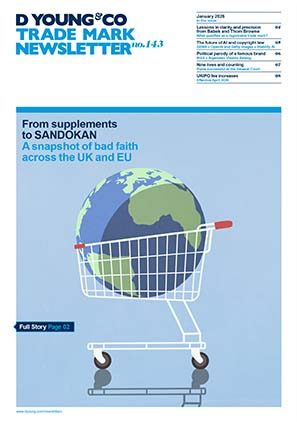UK High Court revokes Pathway’s EASYOFFICE marks for non-use
This was an appeal to the UK High Court from revocation proceedings at the UKIPO. The hearing officer had revoked two UK marks for EASYOFFICE for non-use following revocation actions filed by Easygroup. The marks were registered in class 35 for “Provision of office facilities, rental of office equipment”.
Nice classifications
The hearing officer firstly interpreted the scope of services according to their natural and ordinary meaning, but then adopted a narrower interpretation by reference to the list of goods/services in the Nice classification – this approach was in accordance with guidance published by both the UKIPO and EUIPO, and also the Altecnic case [2001] EWCA Civ 1928. Pathway contended that that approach was wrong, relying on the judgments in Omega Engineering [2010] EWHC 1211 (Ch) (“Omega 1”) and [2012] EWHC 3440 (Ch) (“Omega 2”) and the Fidelis case [2018] EWHC 1097 (Pat), the latter of which were handed down after the hearing officer’s decision.
Although “rental of office equipment” may seem like a straightforward service offering (the hearing officer had interpreted it as “the rental of any equipment that may be used in an office”), in the Nice classification the term “Rental (Office machines and equipment–)*” contained an asterisk which indicated that the rental of machines/equipment that may be used in an office could also be found in other classes (eg “rental of photocopiers” in class 35; “rental of fax machines” was in class 39; “rental of computers” was in class 42; etc.). He concluded that the specifications for the EASYOFFICE marks could not cover these terms.
Considering Altecnic and Omega 1
During the appeal process, the court considered the Altecnic and Omega 1 judgments. In Altecnic, in the context of opposition proceedings, the hearing officer held that the UKIPO had been wrong during the prosecution process to allow the applicant to request a transfer of goods from class 7 to class 11 after filing, despite it being common ground that class 11 was more appropriate. It was held that if a class number is relied on, together with a description of goods/services which may be ambiguous, that class number must be considered part of the descriptor attached to the goods/services. If those are at odds with the class number claimed, the examiner must be able to correct it, but an applicant cannot apply to amend the class itself.
The goods in question (valves) clearly fell in class 7, which was not at odds with the listed goods, so there was no inconsistency and no obvious mistake which could be permissibly amended.
On appeal, the judge held that since the specification did not refer to goods in class 7, and since the class was for administrative convenience only, it did not affect the scope of the specification and therefore the amendment was possible – it was not necessary to show that an obvious error had been made. The Court of Appeal disagreed – it felt that class 7 was a part of the application in the context of the goods covered. Since valves fell within class 7, this was not an obvious mistake.
The Omega 1 case concerned construction of a trade mark co-existence agreement, in the context of which the judge had considered Altecnic. He confirmed that a statement in an application form as to the class of goods covered formed part of the application and was to be taken into account in interpreting the scope of the application at least during the prosecution process – it did not decide whether Altecnic applied in the context of infringement, which remained an open question.
Since he considered it unnecessary to reach a concluded view on the question of whether the scope of a specification should be limited by reference to the Nice class, the judge in EASYOFFICE declined to do so. However, he concluded that he should express a provisional view.
The judge noted that it is appropriate to use class number as an aid to interpretation of the specification where the words used in the specification lack clarity and precision.
In his provisional view, the judge held that this applies to registrations as well as to applications, and therefore applies in the context of infringement and revocation claims. The judge noted that in many cases it will be unnecessary to use the class number in this way, as the words in the specification will be sufficiently clear and precise, and he felt that the words “provision of office facilities” fell into that category. Its ordinary and natural meaning could be ascertained without reference to class number.
The judge made it clear that for the EASYOFFICE case it was not necessary for him to express an opinion on circumstances where the class number would be relevant where the natural and ordinary meaning of the words used in the specification is clear and precise – that is a question for another day.
In the context of revocation actions based on whether or not a mark has been used for the goods/services covered, where a specification otherwise lacks clarity or precision it may be of considerable importance to be able to refer to the class in which the mark has been registered as an aid to interpretation.
The starting point for assessing the meaning of words in a specification should be how the product in question is, as a practical matter, regarded for the purposes of trade. Specifications of services are inherently less precise than those of goods – when assessing them they should be interpreted in a manner which confines them to the core of the ordinary and natural meaning rather than more broadly; terms should not be interpreted so liberally that they become unclear and imprecise.
For the purposes of EASYOFFICE, the judge noted that “provision of office facilities” could in theory extend to cover things such as “provision of in-house catering staff, a fleet of cars, IT support staff etc”. The hearing officer was correct to consider the core of the ordinary and natural meaning of the terms used and to consider that the natural and ordinary meaning of the term “rental of office equipment” is the rental of any equipment that may be used in an office. The natural and ordinary meaning of the term “provision of office facilities” is the provision of anything that facilitates the functioning of an office, which could be a physical item such as furniture, or a human endeavour such as typing services, data processing, photocopying, etc. The judge did not think the term could include the rental of the office itself, as the inclusion of such a service would interpret the phrase so liberally that it would be unclear and imprecise.
The judge seems to have been swayed by the fact that the appellant did not argue that “provision of office facilities” included rental of office space. The skeleton argument filed in the first instance proceedings did not address the ordinary meaning of the term, whereas the respondent’s skeleton had done so (arguing that it did not include rental of office space). The appellant did not appear to reject that interpretation.
In reaching his decision, the judge noted that he was not limiting his interpretation of the phrase and its natural and ordinary meaning to class 35, which worked in Pathway's favour. Even then, he felt that the natural and ordinary meaning of the term “provision of office facilities” was clear and precise – and that it did not include rental of office space.
The appeal failed, and the marks were deemed to have been correctly revoked. Even if the judge had been prepared to accept that the term “provision of office facilities” did include the rental of office space, the evidence submitted did not constitute genuine use in relation to those services.
In short
The case confirms how complex seemingly simple aspects of trade mark law actually are.
Specifications need to be considered carefully at the point of filing to ensure that all possible goods/services of interest are included. Regular audits and reviews should be conducted to ensure that a brand owner’s constantly changing and evolving business model remains sufficiently covered in terms of trade mark protection.
The case also highlights the inevitable and unavoidable risk that a trade mark owner’s interpretation of the natural and ordinary meaning of particular goods/services may not align with a judge’s. Erring on the side of caution is advisable, and thinking laterally when filing applications.
Case details at a glance
Jurisdiction: England and Wales
Decision level: High Court of Justice (Appeals)
Parties: Pathway IP Sarl (formerly Regus No.2 Sarl) and Easygroup Ltd (formerly Easygroup IP Licensing Limited)
Date: 26 November 2018
Citation: [2018] EWHC 3608 (Ch)
Full decision (link):


